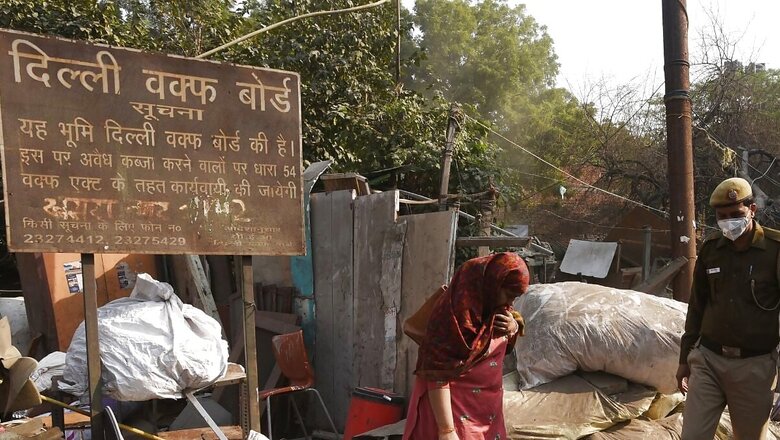
views
The amendment in the Waqf Act made by the Congress has given unbridled powers to the Waqf Board to usurp land, ranging from personal property, government land, temple land to gurdwaras, government sources have said amid buzz that the Centre is all set to bring a Bill in Parliament to amend the 1995 law.
The Bill to amend the Waqf Act, 1995, will make it mandatory for Waqf boards to register their properties with district collectors to ensure their actual valuation. There are 30 Waqf boards in the country. The law will ensure more accountability and transparency and ensure mandatory inclusion of women in these bodies, sources said. They claimed that the move comes in the backdrop of demands from within the Muslim community.
Originally, Waqf boards had around 52,000 properties throughout India. By 2009, there were 3,00,000 registered Waqf properties, making up four lakh acres. As on date, there are more than 8,72,292 registered properties spread over 8,00,000 acres of land which means Waqf land has doubled in just 13 years.
WHAT IS THE WAQF ACT?
The Mussulman Waqf Act, 1923, was introduced by the British who first introduced The Madras Religious and Charitable Endowments Act, 1925, which drew large protests from Muslims and Christians. It was then redrafted to exclude them, made applicable to Hindus only and renamed the Madras Hindu Religious and Endowments Act, 1927.
The Waqf Act was first passed by Parliament in 1954. Subsequently, it was repealed and a new Waqf Act was passed in 1995 which gave more powers to Waqf Boards. In 2013, this Act was further amended to give unlimited powers to Waqf boards to snatch anyone’s property, which even could not be challenged in any court of law.
Simply put, the Waqf Board has unlimited powers to claim properties in the name of Muslim charity — a power that no other religious body in India enjoys.
Section 3 of the Waqf Act, 1995, states that if the Waqf “thinks” that the land belongs to a Muslim, then it is the property of the Waqf. The board does not have to furnish any evidence on why they think the land falls under their ownership.
As per government sources, even countries that follow Muslim laws do not have a Waqf body, nor does any religious body have unlimited powers. Also, the Waqf body did not repatriate any land to the Hindus that migrated from Pakistan during partition.
INSTANCES OF MISUSE
• In the Avinashi case, as per revenue records, 216 people from Devendrakula Vellalar community were given free patta for over 6.3 acres of land in Devendran Nagar in Cheyvur in 1996. But the beneficiaries are now worried about the ownership of the land as the Waqf Board, in a letter to sub-registrar offices in Avinashi, Thottipalayam, and Joint I and Joint II sub-registrar offices of Tiruppur district on August 8, claimed around 93 properties on certain survey numbers in Avinashi and Tiruppur as Waqf properties.
• Thiruchenthurai, a village located on the Cauvery river’s bank in Tiruchirapalli district, also has a 1,500-year-old Sundareswarar Temple. Villagers are now wondering how the Waqf will claim ownership of this property as well.
• The Supreme Court recently held that in the absence of any proof of dedication or user, a dilapidated wall or a platform cannot be conferred a status of a religious place for the purpose of offering prayers or Namaaz. The decision came as a big relief for the Telangana government, as the state had subsequently leased out the land for setting up a university, township and other institutions of repute. The state government had appealed to the Supreme Court after losing out before the Andhra Pradesh high court in April 2012.
• The Rajasthan Board of Muslim Waqf has been requesting financial assistance from the Rajasthan government in order to pay its workers’ salaries. This is in strange contrast to the fact that Waqf Board has more than 18,000 properties listed across Rajasthan and it generates income from more than 7,000 properties.
• The Tamil Nadu Waqf Board has claimed ownership of the 1500-year-old Manendiyavalli Chandrashekhara Swami temple land. The temple has 369 acres of property in and around Tiruchenthurai village in Tamil Nadu.
• In 2021, Waqf Board wrote an application to Gujarat High Court, staking claim on the ownership of two islands in Bet Dwarka in Devbhoomi Dwarka. An irate court, however, refused to hear the application.
















Comments
0 comment